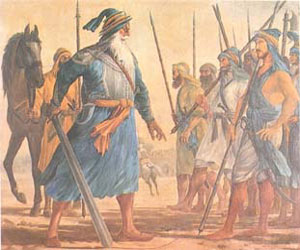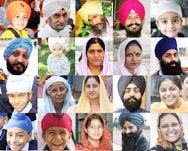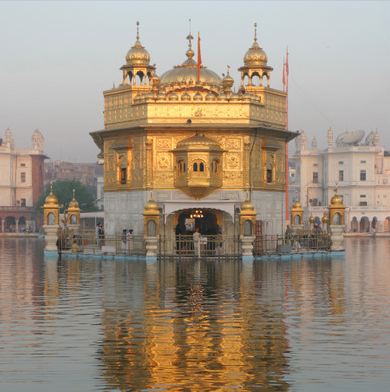
The
Golden Temple of Sikh Dharma
Amritsar, India
Preface
"The Sikhs,
peaceful until disturbed."
The following is presented for the purpose of making the reader more familiar with the lifestyle and practices of Sikh Dharma, a householders' spiritual path by which practice and only by God's grace, one may be blessed with the virtue known as humility and the good fortune to overcome the mental and spiritual affliction known as pride.

Introduction
"We never started a war before,
but we have finished many."
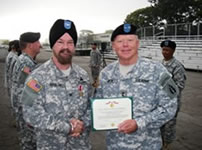
Colonel Gopal Singh Khalsa
Colonel Khalsa joined the U.S. Army in 1976 as a Private, and
served in
the Special Forces Unit for 10 years on Parachute Status, as a Battalion
Commander overseeing an 800-person intelligence group, and also received
a Meritorious Service Medal with Silver Oak Leaf Cluster Award, amongst
many
other honors. He is a graduate of the Army Officer Candidate School
in Georgia,
and was inducted into the Officer Candidate School Hall of Fame in
2004.
Colonel Khalsa currently serves in the reserve command, and has
therefore served in the U.S. Army for 33 years.
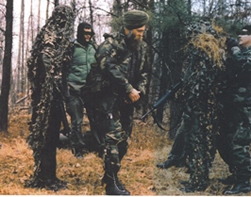
Sergeant Sevak Singh Kroesen
Sergeant Kroesen enlisted in the U.S. Army reserves in 1976 and
was
attached to the Signal Company, 11th Special Forces Group after which
he successfully completed airborne (paratrooper) and Radio Teletype
Transmission Operator training. He then completed his Special Forces
Qualification Courses and became a Special Forces Communications
Sergeant. He completed this rigorous training, and his Sikh articles
of faith
were never a hindrance to his service. Sergeant Kroesen subsequently
completed schools, training, and missions around the world all with
honor
and distinction. He was honorably discharged from active duty in 1991.

Captain Tejdeep Singh graduates from
the US Army's Officers Basic Training.

Sikh guards at Buckingham Palace
"Human
is a blend of saint and soldier; this is a complete person. If you
are not a soldier your sainthood will be kicked around. If you are
only a
soldier and not a saint, you will start kicking others around." Yogi Bhajan
The
history and suffering of Sikhs is one of the most important episodes
in the history of India. Guru Nanak Dev founded Sikhism
in the fifteen century and he was followed by nine Gurus (enlightened
teachers or prophets). Guru Angad developed the Gurumukhi script. Guru Ram Das laid the foundation
for the city of Amritsar. Guru Arjan Dev compiled the Adi Granth,
the sacred texts-songs of the Sikhs (a.k.a. Siri
Guru Granth Sahib).
But it was Guru Gobind
Singh who gave Sikhism a renewed vigor and mass following in the
17th century. Guru Gobind Singh instituted the Akalis. The Akalis
are religious warriors -- soldiers of God.
Today, after episodes of religious persecution in their homeland,
in 1738 by Nadir Shah, in 1748 to 1751 by Ahmed Shah Abdadi, by the
British in 1849, and in 1984, by the government militia in the aftermath
of Prime Minister Indira Gandhi's assassination, and due to their
energetic and entrepreneurial spirit, Sikhs can be found all over
the world.
The Sikhs, or Sardarjis as they are known by some, aside from being great patrons of art, religion and scholarship, are known as the bravest people in India, and their women, among India's most beautiful. The Sikhs have participated in India's nation building for hundreds of years, fighting the British, serving in the military (the Sikh regiment is the most decorated regiment of the Indian army) and excelling in sports. And they have served as President (Gianni Zail Singh, veteran freedom fighter, 1982-87) and Prime Minister (Manmohan Singh) of India.
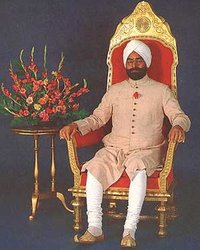

Gianni
Zail Singh Manmohan
Singh
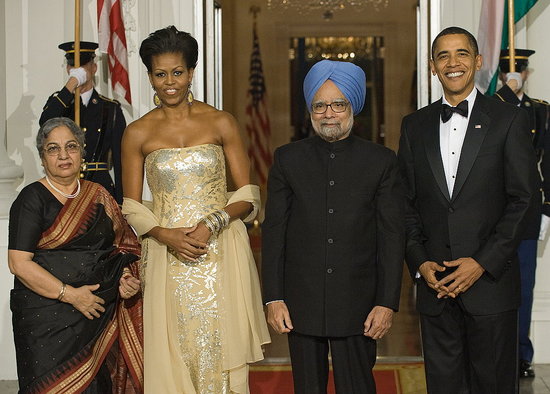
Indian Prime Minister Manmohan Singh and President Barack Obama
and their respective First Ladies at State Dinner, Nov. 24, 2009.
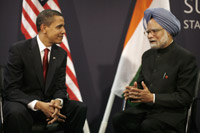
Barack Obama and Manmohan Singh
at the April, 2009 G-20 gathering in Europe.
Historical Background
What follows are the biographies of a few of the many Sikh Warriors who protected Sikhs and others from the onslaught of tyrannical forces. These brave souls protected the Sikh faith and fought battles against oppressors in keeping with the Khalsa spirit of Sikh Dharma. They stood up against tyranny by invaders and oppressors on the battlefield. They raised the sword against aggression in defense of the rights of women, and the weak and defenseless, and never to threaten or oppress others.
Bhai
Garja Singh and Bhai Bota Singh
Bhai
Sukha Singh and Bhai Mehtab Singh
"From
a woman all men are born.
How then can any man degrade any woman?"
The Sikhs
![]() Believe God is Truth and Word
is Guru.
Believe God is Truth and Word
is Guru.
![]() Believe God is the One Creator,
and all of Creation is God's manifestation.
Believe God is the One Creator,
and all of Creation is God's manifestation.
![]() Espouse the role of woman as
representing the Universal Mother.
Espouse the role of woman as
representing the Universal Mother.
![]() Keep their hair
and their beard unshorn, and wrap
their hair in a turban.
Keep their hair
and their beard unshorn, and wrap
their hair in a turban.
![]() Are vegetarians and do not
eat flesh food, i.e., red meat, chicken or seafood.
Are vegetarians and do not
eat flesh food, i.e., red meat, chicken or seafood.
![]() Refrain from using tobacco,
drugs or alcohol.
Refrain from using tobacco,
drugs or alcohol.
![]() Perform sadhana,* i.e., spiritual
practice before sunrise, and recite banis daily.**
Perform sadhana,* i.e., spiritual
practice before sunrise, and recite banis daily.**
![]() Believe all religion and scripture
is an expression of the One Creator.
Believe all religion and scripture
is an expression of the One Creator.
![]() Respect the rights and freedoms
of all spiritual paths.
Respect the rights and freedoms
of all spiritual paths.
![]() Espouse the sanctity of the
path of the householder.
Espouse the sanctity of the
path of the householder.
![]() Believe it is God's blessing
to serve others, and to protect the weak.
Believe it is God's blessing
to serve others, and to protect the weak.
*Sadhana: Derived from a Sanskrit word meaning, Sa-all, and Dhana-blessings.
"The greatest reward of doing Sadhana is that the person becomes incapable of being defeated. Sadhana is a self-victory, and it is a victory over time and space. Getting up in the morning is a victory over time, and doing it is a victory over space." Yogi Bhajan
**Banis are specific passages taken from the Guru and read each day.

